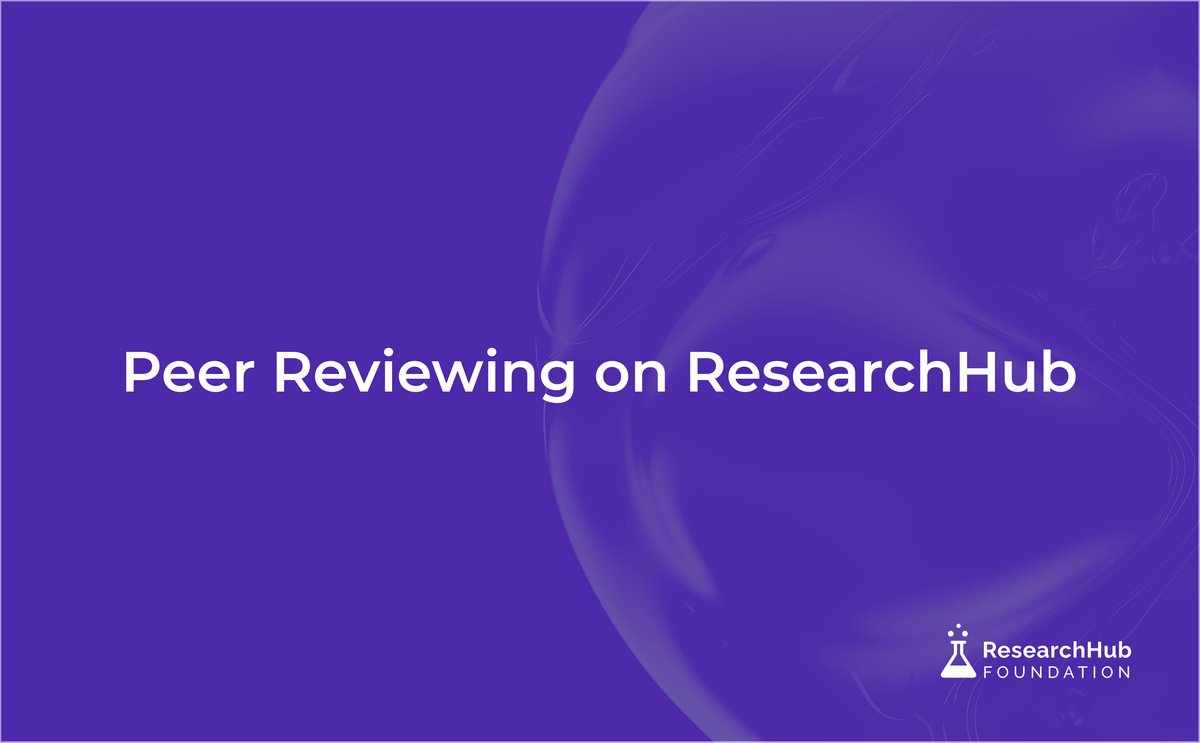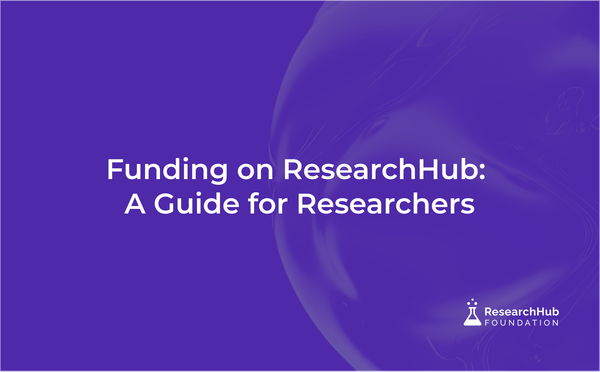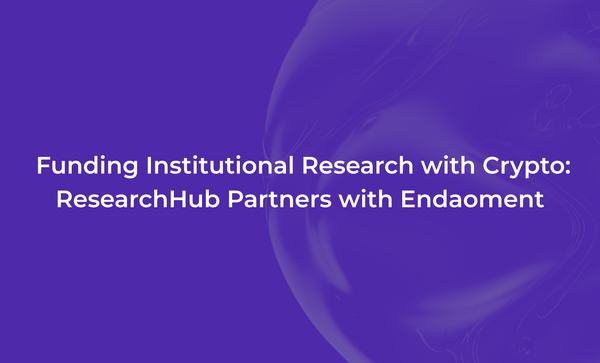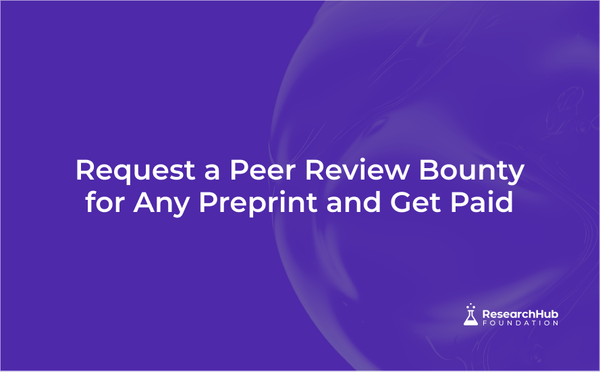Peer Reviewing on ResearchHub

At ResearchHub, our mission is to open and accelerate science. Unlike traditional journals where editors assign reviewers, ResearchHub allows qualified reviewers to self-select papers, creating an open marketplace for peer review. This community-driven model fosters transparency, faster feedback, and broader participation in the scientific process.
This guide will walk you through signing up, finding papers with peer review bounties, writing peer reviews, and receiving compensation.
Sign Up
- Visit ResearchHub: Click the “Join ResearchHub" tab in the top left corner.
- Register: Enter your email address or register using your Google account.
- Complete Your Profile: Fill in information such as your bio, education, social media links, and ORCID.
- Identity Verification: Peer Reviews on ResearchHub are permissionless. To enhance the credibility and visibility of your contributions, you are requested to verify your identity on the ResearchHub platform. As a verified author, you will:
- Receive a verified badge
- Get immediate access to your RSC
- Be able to claim RSC rewards on your papers
- Receive alerts for bounty opportunities
- Publication Import: You can easily import your publications using our streamlined workflow—ensuring your profile accurately reflects your scholarly work. Be sure to claim rewards on your recent open-access papers, too.
Find Preprints to Review
On ResearchHub, you can review any preprint of your choice by browsing existing preprints or uploading a preprint from a preprint server (e.g., bioRxiv, medRxiv, ChemRxiv, arXiv).
Some preprints already have bounties—e.g. bioRxiv preprints are assigned a peer review bounty of $150 in RSC by the editorial team.
- Browse New Preprints.
- ResearchHub automatically pulls in new preprints as they become public.
- Search for Bounties.
- You can search the Earn tab for open peer review opportunities and filter by your preferences.
- Propose Your Preprint of Choice.
- Submit a request to review a preprint of your choice. The editorial team will review all submissions; pre-approval is required.
Write a Peer Review
Do I Need Approval to Peer Review?
No. Peer reviewing does not require any permission to complete. Our editors evaluate all peer reviews to verify quality before payment is disbursed.
- Navigate the Paper’s Page.
Explore the tabs: Paper, Conversation, Bounties, and Peer Reviews. - Start Writing Your Review.
Use the text box on the Peer Reviews tab. Organize your review using the provided rating boxes: Overall Rating, Methods, Impact, Results, and Discussion. Be sure to assign a star rating for each. - Be Professional and Constructive.
Your reviews are visible to everyone, including the authors. Provide professional and constructive feedback. - Do not summarize the preprint.
Authors and editors are already familiar with the content—focus your review on evaluation, not repetition. Highlight strengths, identify weaknesses, and provide constructive feedback that helps improve the work. - AI in Peer Review.
Peer reviewers may not use AI to generate or write their reviews. AI use on ResearchHub is limited to copy editing human-written text and must be fully disclosed. It’s your perspective as a scientist that makes peer review valuable, so please write in your voice. Make sure your review complies with our policy.
- Follow Editorial Standards.
The recommendations below list expectations from our editorial team to peer reviewers regarding individual sections of the peer review process. Additionally, they serve as a tool to eliminate bias and enhance the quality of peer reviews.
What Makes a Peer Review Outstanding?
- Be Specific.
Provide detailed feedback, referencing specific figures, discussion points, or methods. Suggest relevant research, alternative approaches, or future experiments. - Maintain Transparency.
Clearly state your expertise and acknowledge any uncertainties. - Be Critical Yet Constructive.
Offer thorough and balanced critiques, paired with actionable suggestions for improvement. - Demonstrate Rigor.
Address significant issues comprehensively while maintaining a constructive tone.
We recommend perusing these examples of exceptional peer reviews on ResearchHub
- A novel human blood-brain barrier model reveals pericytes as critical regulators of viral neuroinvasion. Reviewed by Hao Yin.
- DuoHexaBody-CD37 induces direct cytotoxic signaling in diffuse large B-cell lymphoma. Reviewed by Xiaowei Wu.
- Dyr726, a brain-penetrant inhibitor of PI3Kα, Type III receptor tyrosine kinases, and WNT signalling. Reviewed by Srividya Bhaskara
- Loss of signaling fidelity between astrocyte endfeet and adjacent cerebral arterioles in an amyloid mouse model of Alzheimer's disease. Reviewed by Connor Wander.
- Organoid-based modeling of platinum resistance identifies KRT17 as both a response mediator and biomarker for targeted therapy in ovarian cancer. Reviewed by Gokhan Bahcecioglu.
Receive Payment
Conditions
Peer reviews must meet all guidelines to qualify for payment. Up to two of the highest quality reviews per paper, as determined by our editors, will receive payment. All decisions by the editorial team on payments are final.
Timeline
Payment is typically made within 7 days, depending on the editors’ turnaround time or if any modifications are requested of you as the reviewer. Please note that our editorial team performs manual quality review checks on all peer reviews.
Amount
You will always receive $150 in ResearchCoin (RSC) at the time of distribution regardless of the price of RSC paid directly to your ResearchHub account. This is why you may see varying amounts of RSC per review. For example:
- If RSC = $1, you will receive 150 RSC
- If RSC = $.10, you will receive 1500 RSC.
Using RSC
We encourage users to use RSC on our platform to fund research, create bounties, tip users, and pay for DOIs.
Converting RSC to Cash
If you would like to convert RSC to cash (USD or other currencies), you can learn more on our blog post.
Need Help?
Attend an Orientation Session.
Please join our weekly orientation sessions where we discuss the ResearchHub platform, the peer review process, and answer any questions you may have.
- Tuesdays and Fridays: 11:00 AM PST
- Wednesdays: 4:00 PM PST
- Meeting link: https://meet.google.com/jww-ndus-kcr
Request a Certificate of Peer Review.
If you’re interested in receiving a certificate from ResearchHub, please email support@researchhub.foundation.
Contact our Team.
- Editorial Team (editorial@researchhub.foundation)
- Arshia Malek, Vice President of Operations (arshia@researchhub.foundation)
FAQs
What is RSC and how can I use it?
Learn more about what RSC is and its functions in our post.
Can I convert my RSC into cash (i.e. USD or other currencies)?
Yes.
Which preprints can I receive $150 for reviewing?
Preprints that have a bounty assigned by the ResearchHub Foundation.
How much RSC do I earn for a peer review?
You will receive $150 worth of RSC at the time of distribution for completing a thorough review, as deemed by our team of editors.
The top 2 highest quality reviews per preprint will receive payment.
All decisions by the editorial team on payments are final.
Can I submit a review on a preprint even though it already has multiple peer reviews?
Yes. Each bounty has a 14-day submission window where the bounty is open. The top 2 highest-quality peer reviews will be eligible for the bounty.
When can I expect payment?
Payment is made within 7 days after the peer review bounty submission window closes.
Can I complete more than one peer review?
Yes. We will award a bounty for every high-quality peer review you complete.
How many peer reviews can be on a preprint?
Currently, there is no limit.
Is ResearchHub a journal?
ResearchHub has recently launched its own journal. You can learn more here.
Can I get a certificate that verifies my peer review contribution?
Yes, if you’d like a certificate from ResearchHub please contact support@researchhub.foundation and we will provide you with a personalized certificate, free of charge.
Does the paper’s author see my review?
ResearchHub focuses on maximizing the openness of all science. All peer reviews are public and can be viewed by the author of the preprint.
What is a preprint?
A preprint is a complete or partially complete version of a manuscript that is shared before journal publication or peer review. Examples include: Biorxiv, Researchsquare, Preprints.org, etc.
Can I list my ResearchHub peer review as an accomplishment on my resume or CV, similar to a traditional journal review?
Yes, we encourage reviewers to highlight their peer review accomplishments on their LinkedIn, resume, and CV.
Does this cost anything to the author of the preprint?
No, currently the peer reviewers’ compensation is subsidized by ResearchHub Foundation in an effort to incentivize open science.





